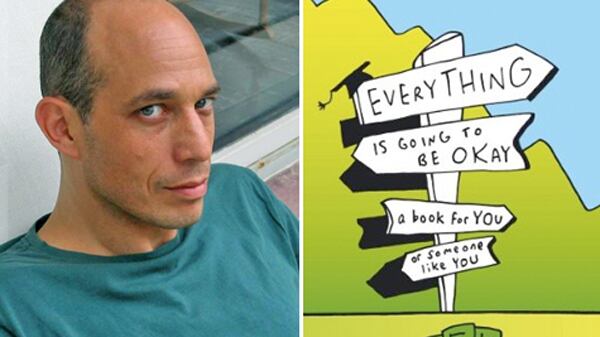Don't worry, recent graduates: Everything Is Going to Be Okay.
Well, maybe. That's the title of cartoonist Bruce Eric Kaplan's latest book, a darkly humorous and sparsely illustrated ode to the class of 2011—but it's not exactly convincing. He tells the story of Edmund, a hapless middle-age man who is mysteriously asked to give a commencement speech at a small college. The task, initially thrilling, soon balloons into an existential crisis. Does he have anything worthwhile to say? Ultimately, Edmund's collision with a creativity roadblock mirrors the uncertain future facing the new graduates.
Think of Dr. Seuss' Oh! The Places You'll Go, but cast under the harsh glare of recessionomics—and sprinkled with a good amount of twentysomething angst.
Kaplan, a staff cartoonist at The New Yorker (who goes by BEK) and a television writer with credits ranging from Six Feet Under to Seinfeld—including, of course, the one where Elaine flies into a rage at an enigmatic New Yorker drawing—admits that the sunny title is as much an aspiration as imparted wisdom.
"It's almost like a pep talk for myself," he says, with the wry humor that has made his cartoons stand out for years, despite his lack of artistic training. "I'm continually working on myself. Nothing ever actually works."
And though the book, Kaplan's eighth, is ostensibly aimed at graduates, it also has special resonance for the author. "One quintessential moment in time is when you're 22, when you graduate college," says Kaplan. "And then another quintessential time is as a middle-age man. That's the convergence."
Everything Is Going to Be Okay makes eloquent use of Kaplan's sparse style. His characters are stocky and vaguely sketched; many of the pages remain mostly blank, with rough drawings framing the border and a few well-chosen words. This is, after all, the guy who wrote for Seinfeld, the show famous for stretching a plot about nothing into 22 minutes of comedy.
The lack of visual clutter underscores Everything's hefty theme: the struggle for meaningful expression. As Edmund is plagued with writer's block, he turns an uneasy eye to his own life. "I've always thought being profound would be easier," Edmund says to himself. "I've been alive for so long. I should have some wisdom by now."
It's a thought that Kaplan—who freely admits the work is autobiographical— experienced himself. It's also one that seems prophetic for graduates with idealistic new college degrees, facing down years of entry-level work as assistants, waiters, and data-entry clerks in a harshly constricted labor force.

"I had it really bad in my 20s," Kaplan says while at a coffee shop in Manhattan, describing his string of low-paying jobs in Los Angeles reading scripts and assisting writers while trying to break into the TV business. "The big thing for me was: I want to say something, but I don't know how to say it—and if I even should be saying it. I just really didn't know, and still don't."
Even when the supposedly "good" jobs started coming in, Kaplan didn't have confidence in his work. He remembers being assigned a script for Tea Leoni's short-lived ‘90s sitcom The Naked Truth (plot summary: Leoni's heroine, Nora, rescues a particularly smart pig from a slaughterhouse fate) and "writhing in agony" under his desk at the mere thought of the task.
"I just wanted to die," he says jokingly.
When Edmund finally stands up in front of the expectant graduates, Everything Is Going to Be Okay takes an absurdist turn. After a promising start, Edmund literally can't stop talking. Nights and weeks pass. As his wife watches in horror, Edmund rambles for months, stringing together clichés, spending days lecturing about ham and cheese sandwiches, Buddhist parables, and, in one hilarious drawing, the movie Tootsie. Overwhelmed by the desire to say something meaningful, he gets trapped in the mundane.
Kaplan ended up completing the Naked Truth script on time, and that gig (among others) led to credits as a resident writer and executive producer for HBO's Emmy-winning series Six Feet Under.
After Six Feet Under's run, Kaplan spent five years trying to sell his own pilot, during which he wrote Everything. He is now a co-executive producer and writer on Girls, an upcoming HBO series starring Lena Dunham, the indie darling who made a big splash at the South by Southwest Music and Media Conference in 2009 with her directorial debut Tiny Furniture, which won the prize for best feature film.
With Dunham, who just turned 25, and Girls, which stars three young women living in Brooklyn and trying to pull their lives together, Kaplan is exploring the same uneasy territory that's in Everything Is Going to Be Okay.
It's not a coincidence, he says. "Part of the reason I wrote the book and was drawn to the TV series is that I connect on some sort of very deep, cellular level with this: Why am I here? What am I doing?"
In the book, Edmund's wife eventually figures out how to stop his graduation filibuster. She runs to the art department and makes a sign with the words, "Everything will be okay." She has realized that Edmund was so worried about the graduates going out into an undefined world that he was trying to keep them in their caps and gowns forever.
Reassured by the sign, and newly buoyed "with the sense of possibility that is all around us," Edmund releases the graduates and goes home content. "Anything is possible," he realizes—and not in a scary way.
It's a surprisingly triumphant tone on which to end, considering Kaplan's stance as a "closeted optimist." He still can't seem to admit that he has something important to say. And how did a book about an existential crisis end up with such a confident name, anyway?
Kaplan smiles. "It's my editor's title."






